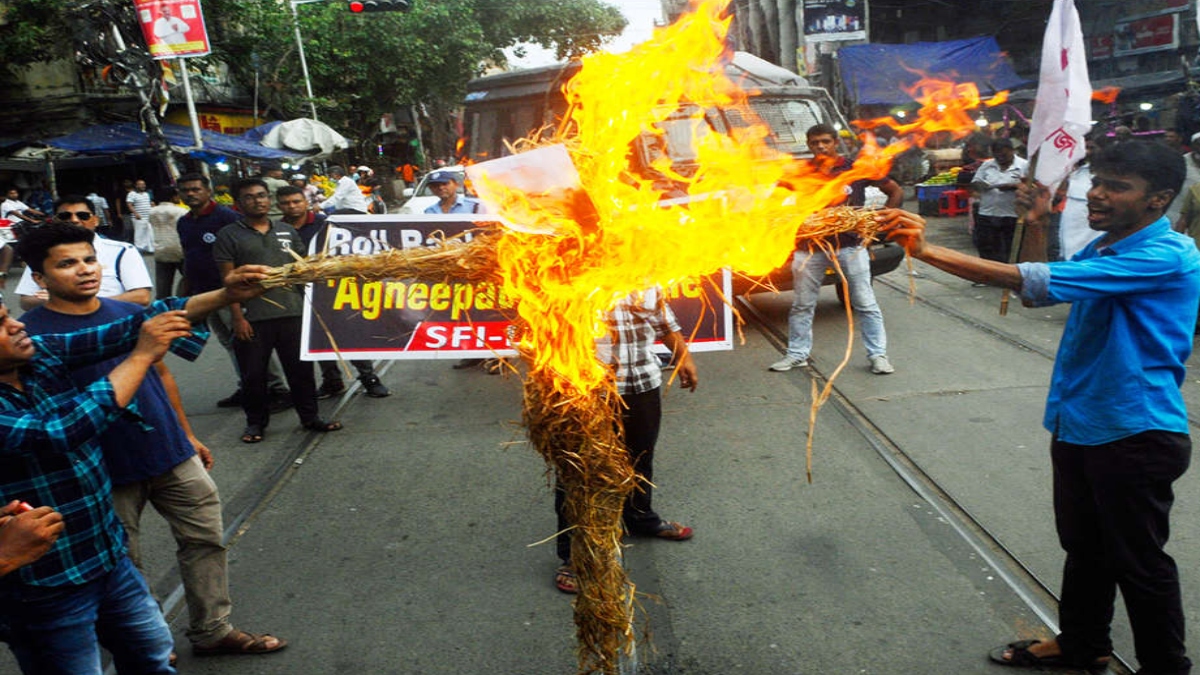
Ever since the government announced the Agnipath scheme, a lot of undisciplined protestors have taken to the streets. In a democratic country, anyone is well within their rights to protest against any action of the government. However, the outright hooliganism, destruction of public property and rioting by protestors are not just condemnable but also prove a serious lack of discipline in pressing for their cause. Potential candidates for recruitment into the elite defence service are expected to protest in a civilized manner. By burning down trains and resorting to violence, these protestors are making a case against themselves on how they are unfit to don the elite uniform. The hooliganism and anarchy on display in the streets are enough to debar these protestors from the candidature. An elite force ready to make the supreme sacrifice for the sake of the nation can do well without these criminal elements destroying public property.
The Agnipath scheme is an effective initiative by the government aimed at structural reforms in the armed forces. The defence budget of India has been increased by the Modi government from 2.53 lakh crores in 2014 to 5.25 lakh crores in 2022. Unlike the earlier wars that the Indian army fought and won, the warfare of the future will be primarily a contest of technological prowess. The Modi government has displayed proactiveness in procuring the best available technology to arm the country with an effective deterrent. In a security apparatus dominated by technology, youthful dynamic foot-soldiers well-versed with the latest technology and sheer muscle power are a requisite. A proper meritocratic system where the best talents are retained for a longer-term would ensure that the army gets the best of the best foot on the ground to protect our borders. The Agnipath scheme backed by the three service chiefs would ensure an enhanced youthful profile of the force and result in the reduction of average age from 32 to 26 years over a period of time. A youthful profile for the defence forces will lead to increased dynamism, competitiveness to be retained for the long haul and optimal utilization of the defence budget. The tech-heavy jawan of the future will require multiple skillsets to guard our borders and Agniveers would be ideal for this technological revolution. The world is moving into an era where drones and robotic technology will slowly replace manual interventions. The soldiers of the future need to be dynamic and adaptable to the changes in technology. Cyber warfare is emerging as a huge threat and India has been ramping up its cyber assets toward this end. While the earlier reforms in defence were necessitated by adverse situations or wars, the Modi government has proactively optimized defence without the need for external circumstances. It is notable that the past 75 years have seen 2 reorganisation exercises apart from a few administrative revamps in the wake of Kargil and Op Parakram. The two reorganisations were around the 1960s after the debacle of the 1962 war and following the KV Krishna Rao committee of 1975. The current average age of uniformed officers can be attributed to the recruiting spree following 1962 and the increase in retirement ages. The manpower-heavy recruitment of prior decades was justifiable.
With the Agnipath initiative, the Modi Government in a single stroke recruits dynamism and youthfulness into our armed forces while also calibrating the defence structure in line with new theatres of war. The misinformation regarding this move has fuelled a spate of protests across the country as if Agnipath isn’t in the interest of the country. Whether the vandalism on the streets is by candidates or are the vested interests trying to take advantage by creating a crisis situation, needs to be investigated. The Modi government with the Agnipath scheme has continued to live up to its reputation of biting the bullet on vital reforms. Whether it’s section 370 of J&K or GST or Defence reforms, the Modi government is making good use of its majority, which the Indian citizens handed to the BJP. India always needed a strong decision-maker and reformer and India has got one.
The author is BJP spokesperson, advisor to former Chief Minister of Maharashtra, Devendra Fadnavis, and executive director of Maharashtra Village Social Transformation Foundation, a Section 8 Company of the Maharashtra government.